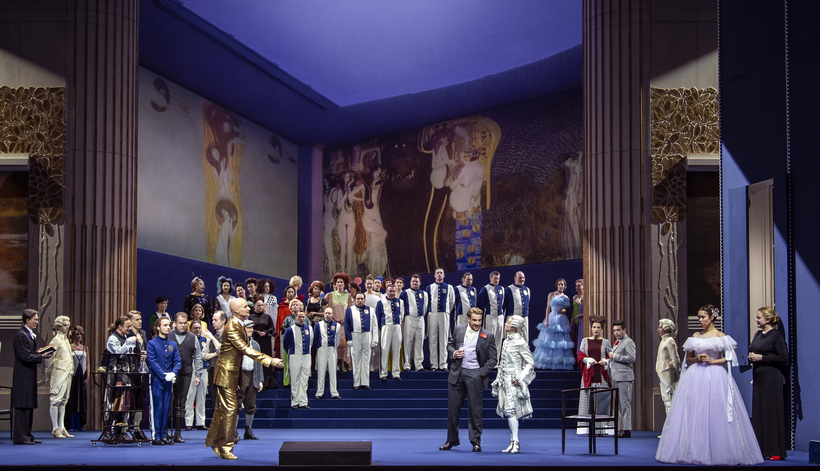“Throw reason and restraint to the wind before you begin,” advised the Swarthmore professor Eugene Weber, when he passed along the recipe of the original Rosenkavalier torte to Craig Claiborne, the American taste-maker supreme and food editor at The New York Times. Whipped up in honor of the beloved Richard Strauss opera, this triple-tier indulgence of mixed nuts, chocolate, and jam was the creation of Mrs. Hugo von Hofmannsthal, wife of the celebrated Rosenkavalier librettist. Her frosting alone called for a pound of butter. She said to slice servings very thin.
Even music-lovers who eat up Der Rosenkavalier sometimes blanch at the empty calories. Nevertheless, the white-on-silver, powdered-wig window dressing of tradition has proved hard to shake. At the Metropolitan Opera, it wasn’t until 2017 that Der Rosenkavalier got the kind of radical reboot that is de rigueur in Europe for repertoire across the board. With the rococo froufrou much reduced, this is the version that will be streaming for 23 hours beginning on Sunday, April 19, at 7:30 p.m. E.D.T., one in a daily rotation of free encores from the company’s chockablock live-HD archive.
“Throw reason and restraint to the wind before you begin.”
Swoon to the waltzes, but expect some jolts. The director Robert Carsen has moved the action forward to 1911, the year of the work’s premiere. War is brewing, and Carsen won’t let us forget it. Heavy artillery clutters the décor. If in love scenes romance still scatters its bewitching perfume, the low comedy of the third act is spiked with nudity and monkey business that in more repressed days would have earned the show an X rating. Wisely, Carsen stages the climactic trio for the Marschallin, Octavian, and Sophie without distractions, allowing the music to do its transcendent work.
A farewell performance always casts a special aura, and this Rosenkavalier—the last of the production’s premiere season—included not one but two. Renée Fleming revisited the aristocratic Marschallin, a signature role for her at the Met since 2000. The volatile teenage boy toy Octavian of Elīna Garanča, long a fixture on other international stages, was new to New York. Kissing their characters good-bye, Fleming invested her scenes with fresh touches of autumnal nuance, while Garanča quite simply caught fire in all her character’s many guises: ecstatic sensualist, angelic Knight of the Rose, and in masquerade as the imaginary Mariandl, the Marschallin’s frisky chambermaid.
And there was more. As the skirt-chasing fortune hunter Baron Ochs, Günther Groissböck projected not just privilege and libido but also more than an edge of menace. As the armaments heiress Sophie, Erin Morley (no pip-squeak ingénue) gives him a real fight. —Matthew Gurewitsch

